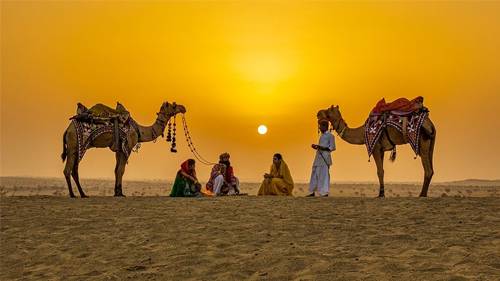
Eighty-year-old Prem Chand’s family lives across the border, on the other side of the Thar desert, in Barmer District of Rajasthan in India. His eyes widen as he recalls the good times he has spent with his family in their ancestral home in Barmer. Chand presently lives in a Pakistani village near the border. In his old age, he’d like to visit his family and bow his head on the doorstep of his ancestral home for one last time.
Interactions between Chand’s family, split by the partition of 1947, was regular before the Kargil war. After the war, border crossings became difficult. Soon after, Chand’s grandparents passed away. He says that it is very painful to not attend the last rites of your loved ones.
There are many like Chand who have been separated from families by the border between India and Pakistan.
One man, who is a resident of Umerkot district in Sindh, Pakistan, had four sons; three of them lived in Jodhpur, India. About three years ago, one of the sons living in Jodhpur died, but the father could not attend his final rites.
In Thar, it’s common for families to be separated by the border. One brother may live on this side of the border in Pakistan, another on the other side in India. Before the 1965 war, it was easy for people from India and Pakistan to meet. After the war, though the border was closed, people would still get visa and travel to meet family in the neighbouring country. The Kargil war restricted their interaction completely.
To bridge the gap, after almost 40 years, the Thar Express started on the basis of the Simla Agreement in February 2006. Like Samjhota Express, the Thar Express ran between India and Pakistan. It links Karachi cantonment station to the Bhagat Ki Kothi station some three kilometres away from Jodhpur, India. Earlier, during the British rule, the Sindh Mail used to run between Bombay (Mumbai) and Karachi.
The Thar Express ran on the weekly basis. But, the service was cancelled till further notice in 2019 as the relations between the two countries further worsened. The train service has not been restored since then.
Visa issues have made it close to impossible to retain family relations. Marriages from across the borders that were once normal have become rare. Couples already in cross-border marriages are unable to keep touch with families.
The governments of both the countries should formulate a joint strategy to make this border a crossing point. The Kartarpur corridor has been working smoothly since it opened in November 2019. Punjab has the Wagah border crossing point, Balochistan has Taftan as a crossing point between Iran and Pakistan, Gilgit-Baltistan has the Khunjerab pass, KP shares Torkham as a crossing point with Afghanistan, but why is such a facility not provided to people of Sindh?
The writer is a media communication student in NUML, Islamabad, Pakistan.
Interactions between Chand’s family, split by the partition of 1947, was regular before the Kargil war. After the war, border crossings became difficult. Soon after, Chand’s grandparents passed away. He says that it is very painful to not attend the last rites of your loved ones.
There are many like Chand who have been separated from families by the border between India and Pakistan.
One man, who is a resident of Umerkot district in Sindh, Pakistan, had four sons; three of them lived in Jodhpur, India. About three years ago, one of the sons living in Jodhpur died, but the father could not attend his final rites.
In Thar, it’s common for families to be separated by the border. One brother may live on this side of the border in Pakistan, another on the other side in India. Before the 1965 war, it was easy for people from India and Pakistan to meet. After the war, though the border was closed, people would still get visa and travel to meet family in the neighbouring country. The Kargil war restricted their interaction completely.
To bridge the gap, after almost 40 years, the Thar Express started on the basis of the Simla Agreement in February 2006. Like Samjhota Express, the Thar Express ran between India and Pakistan. It links Karachi cantonment station to the Bhagat Ki Kothi station some three kilometres away from Jodhpur, India. Earlier, during the British rule, the Sindh Mail used to run between Bombay (Mumbai) and Karachi.
The Thar Express ran on the weekly basis. But, the service was cancelled till further notice in 2019 as the relations between the two countries further worsened. The train service has not been restored since then.
Visa issues have made it close to impossible to retain family relations. Marriages from across the borders that were once normal have become rare. Couples already in cross-border marriages are unable to keep touch with families.
The governments of both the countries should formulate a joint strategy to make this border a crossing point. The Kartarpur corridor has been working smoothly since it opened in November 2019. Punjab has the Wagah border crossing point, Balochistan has Taftan as a crossing point between Iran and Pakistan, Gilgit-Baltistan has the Khunjerab pass, KP shares Torkham as a crossing point with Afghanistan, but why is such a facility not provided to people of Sindh?
The writer is a media communication student in NUML, Islamabad, Pakistan.

